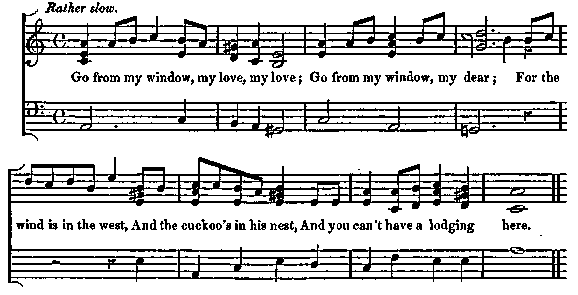Popular Music Of The Olden Time Vol 1
Ancient Songs, Ballads, & Dance Tunes, Sheet Music & Lyrics - online book
| Share page | Visit Us On FB |
|
142 |
ENGLISH SONG AND BALLAD MUSIC. |
|||
|
In Pills to purge Melancholy, 1707, vol. ii., 44, or 1719, vol. iv., 44, is another version of that song, beginning, "Arise, arise, my juggy, my puggy;" but in both editions it is printed to the tune of "Good morrow, 'tis St. Yalentine's day," and not to the original music.
I received the following traditional version of " Go from my window " from a very kind friend of former days, the late R. M. Bacon, of Norwich.* The tune is very like that of Ophelia's Song, "And how should I your true love know;" the first and last strains being the same in both. The words promise an improvement of the original, and it is to be regretted that my informant had only heard the first stanza, which is here printed to the music. |
||||
|
|
||||
 |
||||
|
DULCINA.
This tune is referred to under the names of " Dulcina;" " As at noon Dulcina rested; " " From Oberon in fairy-land ; " and " Robin Goodfellow."
The ballad of " The merry pranks of Robin Goodfellow " (attributed to Ben Jonson) commences with the line, " From Oberon in fairy-land;" and in the old black-letter copies, is directed to be sung to the tune of Dulcina, The ballad of " As at noon Dulcina rested," is said, upon the authority of Cayley and Ellis, to have been written by Sir Walter Raleigh. Both are printed in Percy's Reliques of Ancient Poetry, series iii., book 2.
The Milk-woman in "Walton's Angler, says, "What song was it, I pray you? Was it, "Come, shepherds, deck your heads," or "As at noon Dulcina rested," &c. |
||||
|
» Mr. Bacon was for many years the well-known editor, as well as principal proprietor, of The Norwich Mercury, and editor of The Quarterly Musical Review. His memory was bo stored with traditional songs, learnt in boyhood, that,haling accepted a challenge at the tea-table to sing a song upon any subject a lady would mention, I have heard him sing verse after verse upon tea-spoons, and other such themes, proposed as the most unlikely for |
songs to have been written upon. He had learnt a number of sea songs, principally from one old sailor, and some were so descriptive, that it was almost thrilling to hear them sung by him. Seventeen years ago, these appeared to me too irregular and declamatory to be reduced to rhythm, but I have since greatly regretted the loss of an opportunity that can never recur. |
|||